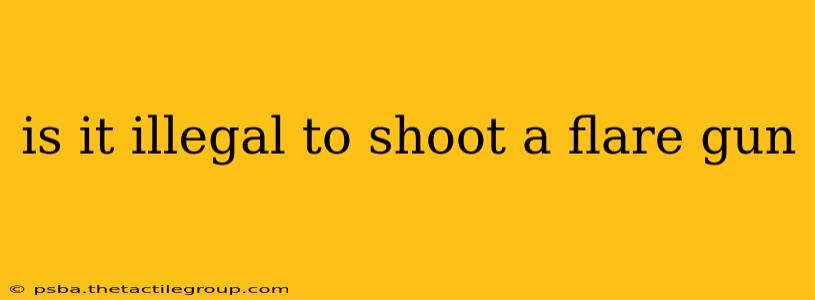Is It Illegal to Shoot a Flare Gun? A Comprehensive Guide to Flare Gun Laws
Firing a flare gun might seem like a harmless activity, particularly in emergencies or for signaling purposes. However, the legality surrounding flare gun ownership and usage is surprisingly complex and varies significantly depending on location and specific circumstances. This guide will delve into the legal intricacies surrounding flare gun use in the United States, emphasizing the importance of understanding local, state, and federal regulations.
The Short Answer: It Depends. Simply put, it's not automatically illegal to own a flare gun, but firing one without proper authorization and in inappropriate situations is almost certainly illegal.
Federal Regulations Regarding Flare Guns
At the federal level in the US, the Bureau of Alcohol, Tobacco, Firearms and Explosives (ATF) regulates firearms, including flare guns. While flare guns aren't typically considered "firearms" in the same vein as handguns or rifles, they still fall under certain regulations depending on their design and intended use. Specifically, the ATF considers a flare gun a firearm if it's capable of firing a projectile that can cause injury. This means certain larger or modified flare guns could be subject to stricter regulations, including registration and licensing requirements.
State and Local Laws: The Key Difference
The significant variation in legality comes down to state and local laws. Many states have specific laws concerning the discharge of pyrotechnics, including flare guns. These laws often address:
- Permits and Licenses: Some jurisdictions may require permits or licenses to own or discharge a flare gun.
- Location Restrictions: Firing a flare gun in populated areas, near airports, or within city limits is typically prohibited. Rural areas might have different regulations.
- Specific Events: Using flare guns during certain events (like celebrations or protests) may be strictly regulated or outright banned.
- Intent: The intent behind firing the flare gun is a crucial factor. Using it for legitimate signaling in a genuine emergency is vastly different from using it for recreational purposes or to cause alarm.
Potential Charges for Illegal Flare Gun Use
Consequences for illegal use of a flare gun can range from significant fines to imprisonment, depending on the severity of the offense and the specific laws violated. Potential charges could include:
- Discharging a Firearm Within City Limits: A common charge in urban areas.
- Reckless Endangerment: If someone is put at risk due to the reckless discharge of a flare.
- Violation of Firearm Laws: Depending on the type of flare gun and local regulations.
- Disturbing the Peace: Firing a flare gun unnecessarily can lead to this charge.
When is it Legal to Use a Flare Gun?
The most common legal use of a flare gun is for maritime distress signaling. Boaters often carry flare guns specifically for this purpose, and proper training and licensing may be required for their use. However, even in maritime emergencies, misuse or failure to comply with regulations can lead to legal repercussions.
Navigating the Legal Landscape: Key Steps
- Check your State and Local Laws: This is paramount. Use official government websites to find the specific regulations in your area.
- Understand Your Flare Gun: Know the type of flare gun you possess and whether it fits the definition of a firearm in your jurisdiction.
- Proper Training: If you intend to use a flare gun for maritime purposes, receive proper training and licensing.
- Only Use in Emergencies: Avoid using a flare gun for recreational or celebratory purposes.
- Consult Legal Counsel: If you have questions or concerns about the legality of owning or using a flare gun, consult a legal professional.
In conclusion, the legality of shooting a flare gun is far from straightforward. A deep understanding of federal, state, and local regulations is essential to avoid potential legal issues. Always prioritize safety and legality when dealing with pyrotechnics and firearms.

